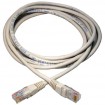Associate
- Joined
- 8 Mar 2016
- Posts
- 15
My WiFi is outperforming my ethernet - before I splurge to replace my router I want to confirm that it is in fact the bottleneck. I've just purchased the ethernet cable and the PC is a recent build. My router is the bog standard supplied by my ISP (Hyperoptic) but I haven't been able to find definitive proof of the ethernet speeds it outputs, I've just found info on its WiFi capabilities. My goal was to reduce latency with the ethernet cable.
Mobo: B450 GAMING PRO CARBON MAX WIFI
Ethernet Cable: 30m Cat 7 Ethernet Cable
Router: Tilgin HG2381
So what is the issue here? Dodgy ethernet cable? Poor network adapter on the mobo? Or as I expect, the router is just not up to snuff. Am I being dumb and there's potentially some PC/Router settings that I may be missing? Let me know if I can provide more info!
Ookla Speedtest results (Mbps):
WiFi Down: 138, Up: 210
Wired Down: 94, Up: 94
Mobo: B450 GAMING PRO CARBON MAX WIFI
Ethernet Cable: 30m Cat 7 Ethernet Cable
Router: Tilgin HG2381
So what is the issue here? Dodgy ethernet cable? Poor network adapter on the mobo? Or as I expect, the router is just not up to snuff. Am I being dumb and there's potentially some PC/Router settings that I may be missing? Let me know if I can provide more info!
Ookla Speedtest results (Mbps):
WiFi Down: 138, Up: 210
Wired Down: 94, Up: 94



